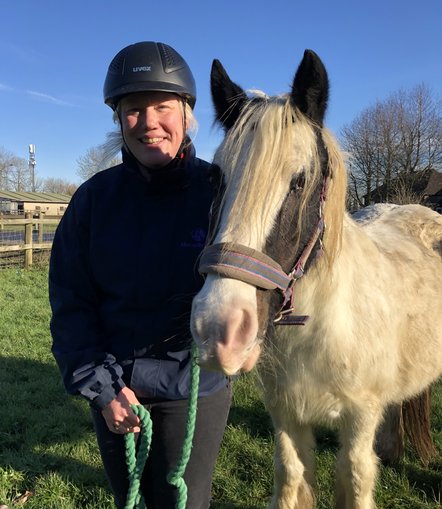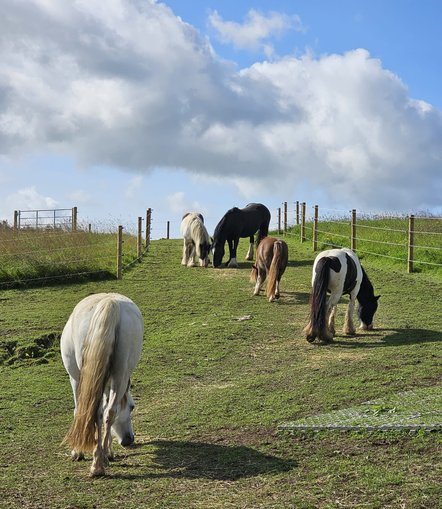HorseWorld's groundbreaking study offers new solutions to combat equine obesity
We are proud to announce the publication of our very first peer-reviewed scientific paper – a landmark achievement that shines a light on innovative ways to address the growing problem of equine obesity.
For over a decade, we have been successfully using track systems to help manage the weight and overall health of some of our rescued herds. While these systems have become increasingly popular across the equine community, there has been very little scientific evidence available to demonstrate their impact – until now.

The Hilly Track: One of three track systems here at HorseWorld
In partnership with the Equine Department at Hartpury University, our Equine Welfare Consultant Kate Fletcher worked alongside our team to carry out a detailed study assessing the effectiveness of different grazing management systems.
The study, entitled “Tracking the Track: The Impact of Different Grazing Strategies on Managing Equine Obesity”, monitored bodyweight, body condition score, hoof health, and behaviour across a group of 19 horses of mixed breeds and types – all identified as being prone to excessive weight gain and managed accordingly.
The results were clear: horses living on track systems lost significantly more weight than those in traditional paddocks. Importantly, their hoof health and overall welfare remained stable, with no negative behavioural effects observed.
This research provides much-needed scientific evidence to support what many track system users have long experienced in practice. It also marks a major step forward for HorseWorld, reflecting our ongoing commitment to improving equine welfare through innovation and evidence-based solutions.
Head of Equine Welfare at HorseWorld, Sarah Hollister says:
"We are thrilled to share this research. Equine obesity is a major welfare concern, and this research provides reassurance and insights for anyone considering how best to manage the welfare of obesity-prone equines in their care.
"The creation of the track system at HorseWorld was made possible thanks to a grant from the Pets Foundation – a charity established by Pets at Home in 2006, dedicated to making a difference to pets and people."

Head of Charity and Community at the Pets Foundation, Amy Angus says:
"We're proud to support the incredible work of HorseWorld by funding their track system. This system improves the wellbeing of the horses in their care and has been shown through their subsequent study that track systems directly tackle equine obesity. We'd like to say a huge thank you to all of the supporters who made this possible by donating to the Pets Foundation."

Below you can download a visual, simplified version of the study or use the button to read the published paper.
Key results from the study:
- When comparing each horse’s July bodyweight versus late-September bodyweight there was a statistically significant difference between grazing management groups. Those horses kept on the track system lost an average of 3.4% of their initial bodyweight compared to those on the traditional paddock grazing system who gained an average of 1.5% of their bodyweight over the period of data collection.
- This study found clear evidence that horses susceptible to gaining bodyweight in the summer period when the sward is at its most nutritious and calorific can be managed effectively utilising track grazing systems; reducing bodyweight during a summer season whilst maintaining hoof health and general welfare.
- A common concern when introducing new or innovative equine management systems is the possible impact on equine behaviour and safety. During this study, there were no significant differences in equine behaviour displayed between grazing systems.
- Researching within the confines and requirements of an operational equine welfare charity proved not only challenging, but also extremely rewarding. It allowed the research team to gather “real-world” data applicable to both those either working in the equine rescue charity sector and to horse owners facing the challenges of managing horses that are susceptible to weight gain. Most horse owners want to manage their horses well, but report facing barriers in terms of published research that “works” in the real world and “resistance” from established practitioners and practices.
Further reading:
Equine obesity poses significant health risks, including laminitis and equine metabolic syndrome. Recent studies have highlighted the severity of this issue:
- A study by the Animal Health Trust found that 31% of 785 horses and ponies assessed between 2009 and 2011 were classified as obese.
- Research from The University of Nottingham revealed that at least one in five leisure horses are overweight or obese, suggesting that equine obesity rates may mirror those in humans.


